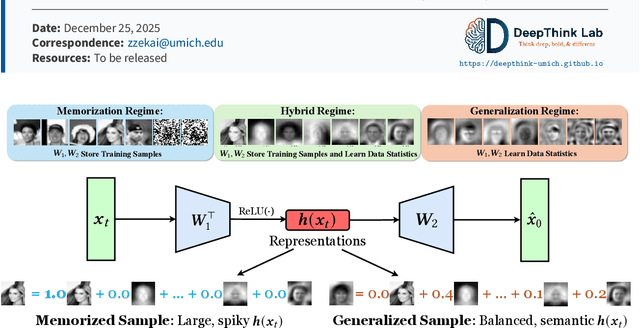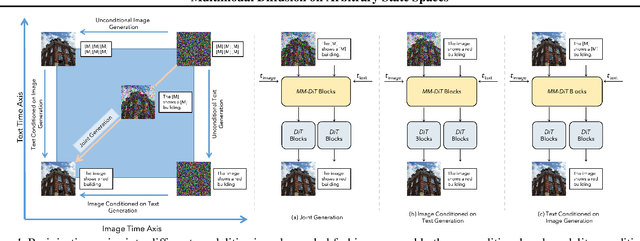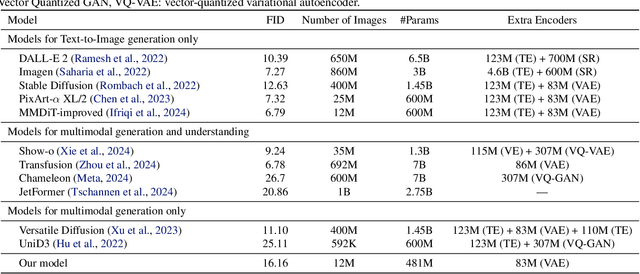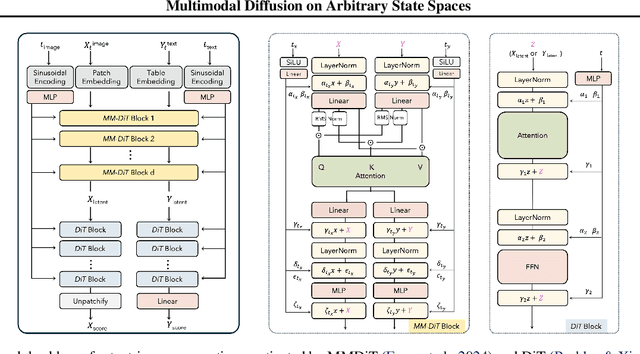Molei Tao
Diffusion Model's Generalization Can Be Characterized by Inductive Biases toward a Data-Dependent Ridge Manifold
Feb 05, 2026Abstract:When a diffusion model is not memorizing the training data set, how does it generalize exactly? A quantitative understanding of the distribution it generates would be beneficial to, for example, an assessment of the model's performance for downstream applications. We thus explicitly characterize what diffusion model generates, by proposing a log-density ridge manifold and quantifying how the generated data relate to this manifold as inference dynamics progresses. More precisely, inference undergoes a reach-align-slide process centered around the ridge manifold: trajectories first reach a neighborhood of the manifold, then align as being pushed toward or away from the manifold in normal directions, and finally slide along the manifold in tangent directions. Within the scope of this general behavior, different training errors will lead to different normal and tangent motions, which can be quantified, and these detailed motions characterize when inter-mode generations emerge. More detailed understanding of training dynamics will lead to more accurate quantification of the generation inductive bias, and an example of random feature model will be considered, for which we can explicitly illustrate how diffusion model's inductive biases originate as a composition of architectural bias and training accuracy, and how they evolve with the inference dynamics. Experiments on synthetic multimodal distributions and MNIST latent diffusion support the predicted directional effects, in both low- and high-dimensions.
Rethinking the Design Space of Reinforcement Learning for Diffusion Models: On the Importance of Likelihood Estimation Beyond Loss Design
Feb 04, 2026Abstract:Reinforcement learning has been widely applied to diffusion and flow models for visual tasks such as text-to-image generation. However, these tasks remain challenging because diffusion models have intractable likelihoods, which creates a barrier for directly applying popular policy-gradient type methods. Existing approaches primarily focus on crafting new objectives built on already heavily engineered LLM objectives, using ad hoc estimators for likelihood, without a thorough investigation into how such estimation affects overall algorithmic performance. In this work, we provide a systematic analysis of the RL design space by disentangling three factors: i) policy-gradient objectives, ii) likelihood estimators, and iii) rollout sampling schemes. We show that adopting an evidence lower bound (ELBO) based model likelihood estimator, computed only from the final generated sample, is the dominant factor enabling effective, efficient, and stable RL optimization, outweighing the impact of the specific policy-gradient loss functional. We validate our findings across multiple reward benchmarks using SD 3.5 Medium, and observe consistent trends across all tasks. Our method improves the GenEval score from 0.24 to 0.95 in 90 GPU hours, which is $4.6\times$ more efficient than FlowGRPO and $2\times$ more efficient than the SOTA method DiffusionNFT without reward hacking.
Prism: Efficient Test-Time Scaling via Hierarchical Search and Self-Verification for Discrete Diffusion Language Models
Feb 02, 2026Abstract:Inference-time compute has re-emerged as a practical way to improve LLM reasoning. Most test-time scaling (TTS) algorithms rely on autoregressive decoding, which is ill-suited to discrete diffusion language models (dLLMs) due to their parallel decoding over the entire sequence. As a result, developing effective and efficient TTS methods to unlock dLLMs' full generative potential remains an underexplored challenge. To address this, we propose Prism (Pruning, Remasking, and Integrated Self-verification Method), an efficient TTS framework for dLLMs that (i) performs Hierarchical Trajectory Search (HTS) which dynamically prunes and reallocates compute in an early-to-mid denoising window, (ii) introduces Local branching with partial remasking to explore diverse implementations while preserving high-confidence tokens, and (iii) replaces external verifiers with Self-Verified Feedback (SVF) obtained via self-evaluation prompts on intermediate completions. Across four mathematical reasoning and code generation benchmarks on three dLLMs, including LLaDA 8B Instruct, Dream 7B Instruct, and LLaDA 2.0-mini, our Prism achieves a favorable performance-efficiency trade-off, matching best-of-N performance with substantially fewer function evaluations (NFE). The code is released at https://github.com/viiika/Prism.
Generalization of Diffusion Models Arises with a Balanced Representation Space
Dec 24, 2025



Abstract:Diffusion models excel at generating high-quality, diverse samples, yet they risk memorizing training data when overfit to the training objective. We analyze the distinctions between memorization and generalization in diffusion models through the lens of representation learning. By investigating a two-layer ReLU denoising autoencoder (DAE), we prove that (i) memorization corresponds to the model storing raw training samples in the learned weights for encoding and decoding, yielding localized "spiky" representations, whereas (ii) generalization arises when the model captures local data statistics, producing "balanced" representations. Furthermore, we validate these theoretical findings on real-world unconditional and text-to-image diffusion models, demonstrating that the same representation structures emerge in deep generative models with significant practical implications. Building on these insights, we propose a representation-based method for detecting memorization and a training-free editing technique that allows precise control via representation steering. Together, our results highlight that learning good representations is central to novel and meaningful generative modeling.
From Masks to Worlds: A Hitchhiker's Guide to World Models
Oct 23, 2025Abstract:This is not a typical survey of world models; it is a guide for those who want to build worlds. We do not aim to catalog every paper that has ever mentioned a ``world model". Instead, we follow one clear road: from early masked models that unified representation learning across modalities, to unified architectures that share a single paradigm, then to interactive generative models that close the action-perception loop, and finally to memory-augmented systems that sustain consistent worlds over time. We bypass loosely related branches to focus on the core: the generative heart, the interactive loop, and the memory system. We show that this is the most promising path towards true world models.
Variational Learning Finds Flatter Solutions at the Edge of Stability
Jun 15, 2025Abstract:Variational Learning (VL) has recently gained popularity for training deep neural networks and is competitive to standard learning methods. Part of its empirical success can be explained by theories such as PAC-Bayes bounds, minimum description length and marginal likelihood, but there are few tools to unravel the implicit regularization in play. Here, we analyze the implicit regularization of VL through the Edge of Stability (EoS) framework. EoS has previously been used to show that gradient descent can find flat solutions and we extend this result to VL to show that it can find even flatter solutions. This is obtained by controlling the posterior covariance and the number of Monte Carlo samples from the posterior. These results are derived in a similar fashion as the standard EoS literature for deep learning, by first deriving a result for a quadratic problem and then extending it to deep neural networks. We empirically validate these findings on a wide variety of large networks, such as ResNet and ViT, to find that the theoretical results closely match the empirical ones. Ours is the first work to analyze the EoS dynamics in VL.
Diffuse Everything: Multimodal Diffusion Models on Arbitrary State Spaces
Jun 09, 2025



Abstract:Diffusion models have demonstrated remarkable performance in generating unimodal data across various tasks, including image, video, and text generation. On the contrary, the joint generation of multimodal data through diffusion models is still in the early stages of exploration. Existing approaches heavily rely on external preprocessing protocols, such as tokenizers and variational autoencoders, to harmonize varied data representations into a unified, unimodal format. This process heavily demands the high accuracy of encoders and decoders, which can be problematic for applications with limited data. To lift this restriction, we propose a novel framework for building multimodal diffusion models on arbitrary state spaces, enabling native generation of coupled data across different modalities. By introducing an innovative decoupled noise schedule for each modality, we enable both unconditional and modality-conditioned generation within a single model simultaneously. We empirically validate our approach for text-image generation and mixed-type tabular data synthesis, demonstrating that it achieves competitive performance.
Complexity Analysis of Normalizing Constant Estimation: from Jarzynski Equality to Annealed Importance Sampling and beyond
Feb 07, 2025Abstract:Given an unnormalized probability density $\pi\propto\mathrm{e}^{-V}$, estimating its normalizing constant $Z=\int_{\mathbb{R}^d}\mathrm{e}^{-V(x)}\mathrm{d}x$ or free energy $F=-\log Z$ is a crucial problem in Bayesian statistics, statistical mechanics, and machine learning. It is challenging especially in high dimensions or when $\pi$ is multimodal. To mitigate the high variance of conventional importance sampling estimators, annealing-based methods such as Jarzynski equality and annealed importance sampling are commonly adopted, yet their quantitative complexity guarantees remain largely unexplored. We take a first step toward a non-asymptotic analysis of annealed importance sampling. In particular, we derive an oracle complexity of $\widetilde{O}\left(\frac{d\beta^2{\mathcal{A}}^2}{\varepsilon^4}\right)$ for estimating $Z$ within $\varepsilon$ relative error with high probability, where $\beta$ is the smoothness of $V$ and $\mathcal{A}$ denotes the action of a curve of probability measures interpolating $\pi$ and a tractable reference distribution. Our analysis, leveraging Girsanov theorem and optimal transport, does not explicitly require isoperimetric assumptions on the target distribution. Finally, to tackle the large action of the widely used geometric interpolation of probability distributions, we propose a new normalizing constant estimation algorithm based on reverse diffusion samplers and establish a framework for analyzing its complexity.
Variational Schrödinger Momentum Diffusion
Jan 28, 2025



Abstract:The momentum Schr\"odinger Bridge (mSB) has emerged as a leading method for accelerating generative diffusion processes and reducing transport costs. However, the lack of simulation-free properties inevitably results in high training costs and affects scalability. To obtain a trade-off between transport properties and scalability, we introduce variational Schr\"odinger momentum diffusion (VSMD), which employs linearized forward score functions (variational scores) to eliminate the dependence on simulated forward trajectories. Our approach leverages a multivariate diffusion process with adaptively transport-optimized variational scores. Additionally, we apply a critical-damping transform to stabilize training by removing the need for score estimations for both velocity and samples. Theoretically, we prove the convergence of samples generated with optimal variational scores and momentum diffusion. Empirical results demonstrate that VSMD efficiently generates anisotropic shapes while maintaining transport efficacy, outperforming overdamped alternatives, and avoiding complex denoising processes. Our approach also scales effectively to real-world data, achieving competitive results in time series and image generation.
Diffusion Generative Modeling for Spatially Resolved Gene Expression Inference from Histology Images
Jan 26, 2025



Abstract:Spatial Transcriptomics (ST) allows a high-resolution measurement of RNA sequence abundance by systematically connecting cell morphology depicted in Hematoxylin and Eosin (H&E) stained histology images to spatially resolved gene expressions. ST is a time-consuming, expensive yet powerful experimental technique that provides new opportunities to understand cancer mechanisms at a fine-grained molecular level, which is critical for uncovering new approaches for disease diagnosis and treatments. Here, we present $\textbf{Stem}$ ($\textbf{S}$pa$\textbf{T}$ially resolved gene $\textbf{E}$xpression inference with diffusion $\textbf{M}$odel), a novel computational tool that leverages a conditional diffusion generative model to enable in silico gene expression inference from H&E stained images. Through better capturing the inherent stochasticity and heterogeneity in ST data, $\textbf{Stem}$ achieves state-of-the-art performance on spatial gene expression prediction and generates biologically meaningful gene profiles for new H&E stained images at test time. We evaluate the proposed algorithm on datasets with various tissue sources and sequencing platforms, where it demonstrates clear improvement over existing approaches. $\textbf{Stem}$ generates high-fidelity gene expression predictions that share similar gene variation levels as ground truth data, suggesting that our method preserves the underlying biological heterogeneity. Our proposed pipeline opens up the possibility of analyzing existing, easily accessible H&E stained histology images from a genomics point of view without physically performing gene expression profiling and empowers potential biological discovery from H&E stained histology images.
 Add to Chrome
Add to Chrome Add to Firefox
Add to Firefox Add to Edge
Add to Edge